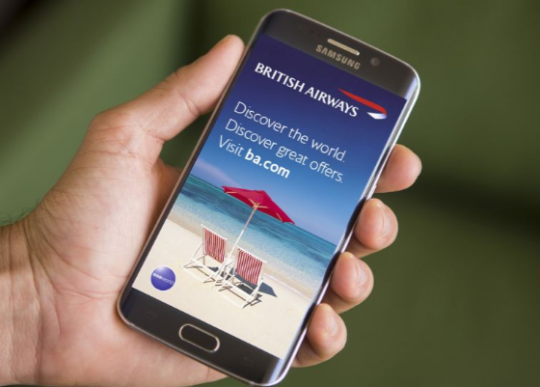
While consumers seem to be doing everything they can to avoid advertisements across their devices, one business is gearing to convince shoppers that they are worth the wait. Tesco Mobile is granting consumers a £3 discount off their monthly bills if they view advertisements on their mobile phones.
The service, known as Tesco Xtras, is available for Android users. Ads only will appear when the phone is unlocked and users will receive an additional 200MB of data each month to cover the data used by the app.
The RTP editorial team shares opinions on whether the practice will be a success for Tesco Mobile and its advertisers, which include British Airways, McDonald’s and Doritos. The editors also discuss whether they would accept discounts and other incentives in exchange for viewing ads.
Debbie Hauss, Editor-in-Chief: We all know how annoyed we get when we are bombarded with unwanted ads, especially when they are irrelevant, and especially when the ad interrupts another activity that we have chosen to spend our valuable time on. So I applaud Tesco for letting consumers decide if they are willing to trade some of their time for an incentive to view some ads. Also, by making the conscious decision to accept the ads I think consumers will be more likely to take the time to consider them, rather than just ignore them or be so annoyed that they make the conscious decision to avoid the brand completely.
Adam Blair, Executive Editor: This strikes me as a great example of a principle that’s too often ignored: don’t punish; incentivize instead. Consumers are getting smarter about the value of their time and attention, so it makes sense to treat advertising as what it is: a transaction. You give me your eyeballs (not literally of course); I give you information, maybe even entertainment, and a discount on your phone bill. This also provides consumers with another valuable item: the power of choice. In any case, ad blocking software is an invitation to a technology arms race that nobody wins, except maybe the coders who earn overtime pay devising ever-trickier ways around the digital barriers. Tesco’s move seems like a smart, sensible alternative.
Alicia (Fiorletta) Esposito, Content Strategist: In my opinion, it is difficult to tell whether this incentive is powerful enough to drive consumer action. While the value is clear, consumers’ response and overall acceptance of this type of experience will vary based on a number of factors. The ones that come to mind are consumers’ overall loyalty to Tesco, how frequently they buy from the retailer, and their monthly spending. Not to mention, people’s overall acceptance of mobile ads varies from person to person and generation to generation. Some find the entire experience clunky and disruptive, while others don’t mind it so much. However, as Debbie noted, I think Tesco deserves a thumbs up for making this an optional function of the app, and winning the opt in, versus bombarding all consumers without notifying them.
David DeZuzio, Managing Editor: Ah, the gamification of our bills. As a consumer, I would love to be paid to watch ads, because I can’t stand watching them for free, so yes, I would accept a discount in exchange for having to watch them. To be completely honest, if you can bring my mortgage payment down $1,000, I’ll watch ads all day. Sure, things won’t get that far, but giving consumers the option of watching or not watching ads is fantastic. However, I would be concerned if the spots were longer than 30 seconds (obvious note to companies: no one wants to sit through two- or three-minute ads, paid or not) as there are times when you can’t wait for an ad to complete, and if there were some sort of optical scanner that made sure you were watching the ads. Creepy? Yes, but don’t think it can’t happen. I think this will work for companies like Doritos, McDonald’s and British Airways for PR value, at the very least. This will be worth watching to see if it catches on.
Klaudia Tirico, Associate Editor: It looks like Tesco is getting its marketing inspiration from mobile game apps, which offer “coins” to unlock levels and/or new characters after the user watches a short video ad. In short, I think offering something in return for ad views is a great idea. It doesn’t force the consumer to watch anything if they don’t want to, and it rewards those who do. As a consumer, I would much rather take a few seconds out of my day to watch an ad if it means saving some money. Additionally, I am not sure if advertisers will be given any data about the users watching these ads, but if they are, this is a good way to get some insight into the users’ content preferences. I’m curious to see if Tesco customers get on board with this.
Glenn Taylor, Associate Editor: Advertising in 2016, especially on any mobile or online medium, always feels like a nuisance that gets in the way of the end result the consumer desires. This is definitely an outside the box idea that puts a new spin on advertising by doing what it needs to do: giving the consumer a reason to stay on the ad. With ad blocking becoming such a large part of the norm for device users, Tesco is finally making the ad watching process reasonable, and may perhaps inspire other brands to improve their ad quality. While I likely would stop paying attention to the ads after a short period of time, I would definitely notice which brands were part of this campaign simply because of how memorable this process would be, which really is all the advertisers could ask for.






